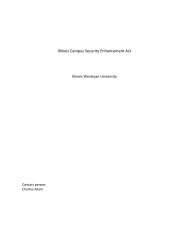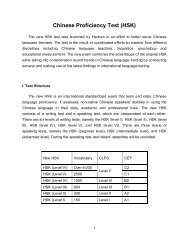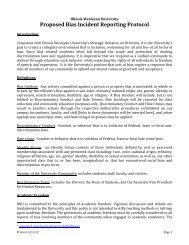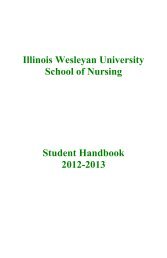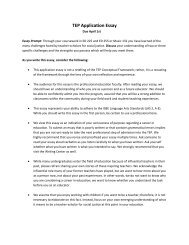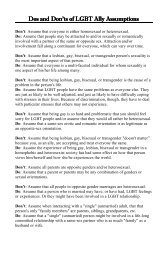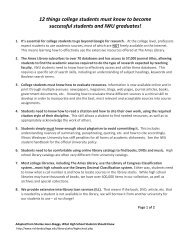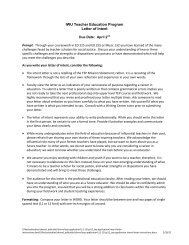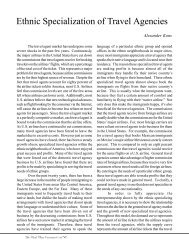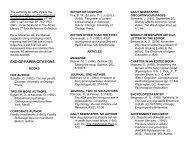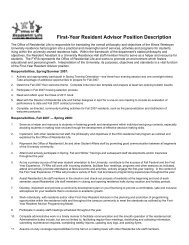ED 201 - Historical and Philosophical Foundations of Education ...
ED 201 - Historical and Philosophical Foundations of Education ...
ED 201 - Historical and Philosophical Foundations of Education ...
You also want an ePaper? Increase the reach of your titles
YUMPU automatically turns print PDFs into web optimized ePapers that Google loves.
you can simply comment upon what another person says on e-mail. The idea is to extend<br />
discussion beyond the classroom without direct instructor interference. At least two <strong>of</strong><br />
your e-mails should include references to books, articles, websites, or sources you have<br />
discovered that pertain to the issue at h<strong>and</strong> outside <strong>of</strong> regular classroom exchange. This is<br />
your opportunity to talk to each other about issues that arise in class. I will monitor the e-<br />
mail only to make sure that the minimum number <strong>of</strong> entries are fulfilled <strong>and</strong> that you<br />
mention at least two external sources in your discussions. This activity will constitute part<br />
<strong>of</strong> your participation <strong>and</strong> attendance grade.<br />
Comparative Book Reviews<br />
Three 7 page book reviews are required for the course. The reviews ask you to compare<br />
two <strong>of</strong> the books we will have read during the term. For each review, you should identify<br />
the title, author, city <strong>of</strong> publication, publisher, <strong>and</strong> date <strong>of</strong> publication <strong>of</strong> the books<br />
subject to review.<br />
Review Number 1 – George Michie, in his book Holler if You Hear Me, tries to use the<br />
actual voices <strong>of</strong> his students in explaining how <strong>and</strong> why teaching can make a positive<br />
difference in their lives. Kate Rousmaniere, in her book City Teachers, argues that New<br />
York City teachers historically have battled for control over their working conditions <strong>and</strong><br />
the teaching methods they would prefer to use, <strong>of</strong>ten with little success. Can inner-city<br />
teachers make a difference in their own lives <strong>and</strong> in the lives <strong>of</strong> the children they teach?<br />
Answer this question by comparing both <strong>of</strong> these books, examining the premises each<br />
author makes, the evidence that they use in support <strong>of</strong> their premises, <strong>and</strong> the adequacy <strong>of</strong><br />
their conclusions.<br />
Review Number 2 – Jonathan Kozol, in Savage Inequalities, uses his role as an outsider<br />
to demonstrate how the systematic injustices <strong>of</strong> the American educational system give<br />
those who are disadvantaged little help. Douglas Foley, in The Heartl<strong>and</strong> Chronicles,<br />
uses his role as an anthropologist <strong>and</strong> former member <strong>of</strong> a rural community, to examine<br />
how schools in his hometown were <strong>and</strong> continue to be insensitive to issues <strong>of</strong> ethnic<br />
diversity. He recounts experiences from his own life <strong>and</strong> interviews former friends <strong>and</strong><br />
associates in arriving at his conclusions. Explain the strengths <strong>and</strong> weaknesses <strong>of</strong> each<br />
methodology, determine which picture <strong>of</strong> educational <strong>and</strong> social inequality is more<br />
accurate, <strong>and</strong> why.<br />
Review Number 3 - Chris Carger, in Of Borders <strong>and</strong> Dreams, shows how his schooling<br />
failed Alej<strong>and</strong>ro <strong>and</strong> the Juarez family at every step, while Peggy Ornstein, in<br />
Schoolgirls, argues that schools are systematically biased against girls. Explain why you<br />
agree or disagree with the extent <strong>of</strong> their pessimism <strong>and</strong> give a series <strong>of</strong> concrete steps<br />
that you think would improve educational outcomes for girls <strong>and</strong> for Latino children <strong>of</strong><br />
all types.<br />
For each review, assume that the reader has not read the books in question <strong>and</strong> back up<br />
your arguments with evidence from the texts, class discussions, <strong>and</strong> personal experience.



